The Cambridge History of China. Vol. 12: Republican China, 1912-1949, Part 1
Подождите немного. Документ загружается.

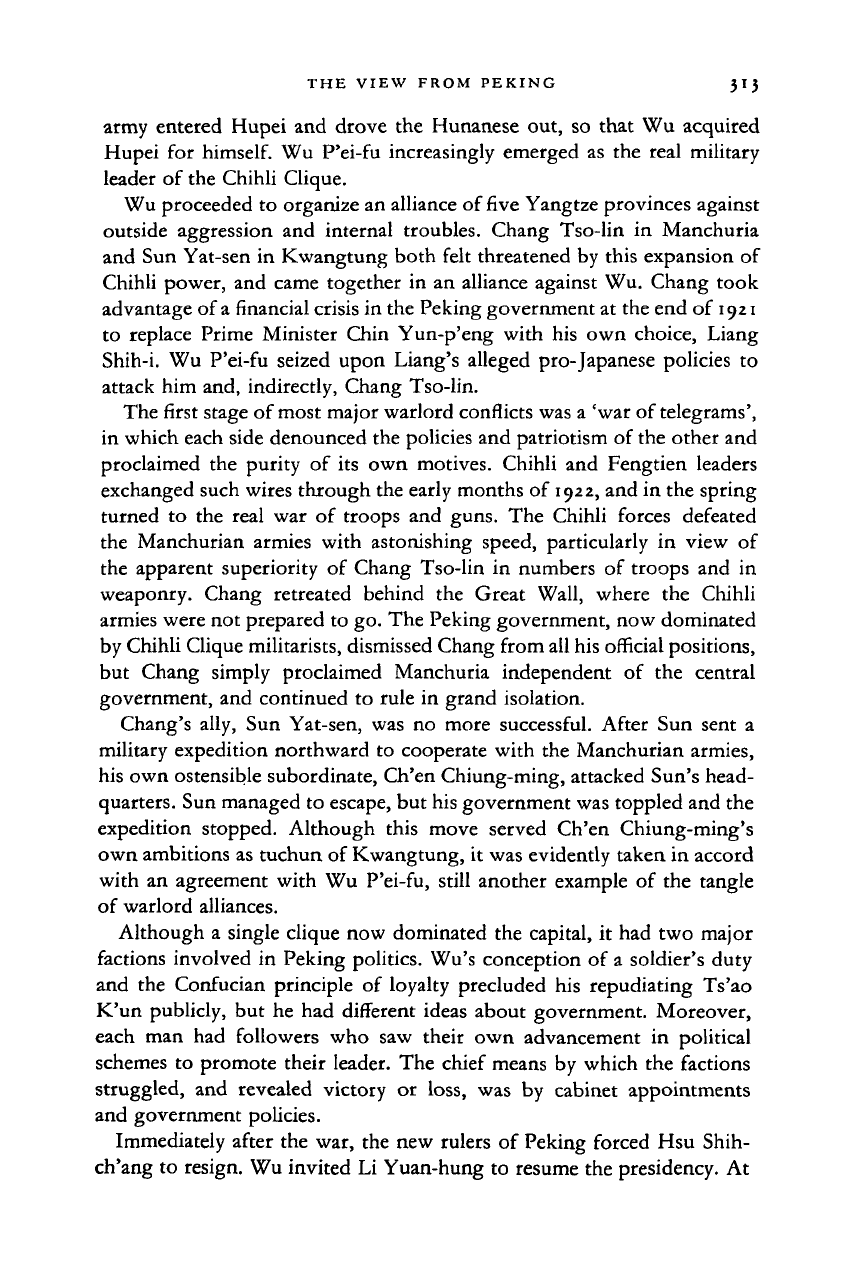
THE VIEW FROM PEKING
3
I 3
army entered Hupei and drove the Hunanese out, so that Wu acquired
Hupei for
himself.
Wu P'ei-fu increasingly emerged as the real military
leader of the Chihli Clique.
Wu proceeded to organize an alliance of five Yangtze provinces against
outside aggression and internal troubles. Chang Tso-lin in Manchuria
and Sun Yat-sen in Kwangtung both felt threatened by this expansion of
Chihli power, and came together in an alliance against Wu. Chang took
advantage of a financial crisis in the Peking government at the end of 1921
to replace Prime Minister Chin Yun-p'eng with his own choice, Liang
Shih-i. Wu P'ei-fu seized upon Liang's alleged pro-Japanese policies to
attack him and, indirectly, Chang Tso-lin.
The first stage of most major warlord conflicts was a 'war of telegrams',
in which each side denounced the policies and patriotism of the other and
proclaimed the purity of its own motives. Chihli and Fengtien leaders
exchanged such wires through the early months of
1922,
and in the spring
turned to the real war of troops and guns. The Chihli forces defeated
the Manchurian armies with astonishing speed, particularly in view of
the apparent superiority of Chang Tso-lin in numbers of troops and in
weaponry. Chang retreated behind the Great Wall, where the Chihli
armies were not prepared to go. The Peking government, now dominated
by Chihli Clique militarists, dismissed Chang from all his official positions,
but Chang simply proclaimed Manchuria independent of the central
government, and continued to rule in grand isolation.
Chang's ally, Sun Yat-sen, was no more successful. After Sun sent a
military expedition northward to cooperate with the Manchurian armies,
his own ostensible subordinate, Ch'en Chiung-ming, attacked Sun's head-
quarters. Sun managed to escape, but his government was toppled and the
expedition stopped. Although this move served Ch'en Chiung-ming's
own ambitions as tuchun of Kwangtung, it was evidently taken in accord
with an agreement with Wu P'ei-fu, still another example of the tangle
of warlord alliances.
Although a single clique now dominated the capital, it had two major
factions involved in Peking politics. Wu's conception of a soldier's duty
and the Confucian principle of loyalty precluded his repudiating Ts'ao
K'un publicly, but he had different ideas about government. Moreover,
each man had followers who saw their own advancement in political
schemes to promote their leader. The chief means by which the factions
struggled, and revealed victory or loss, was by cabinet appointments
and government policies.
Immediately after the war, the new rulers of Peking forced Hsu Shih-
ch'ang to resign. Wu invited Li Yuan-hung to resume the presidency. At
Cambridge Histories Online © Cambridge University Press, 2008
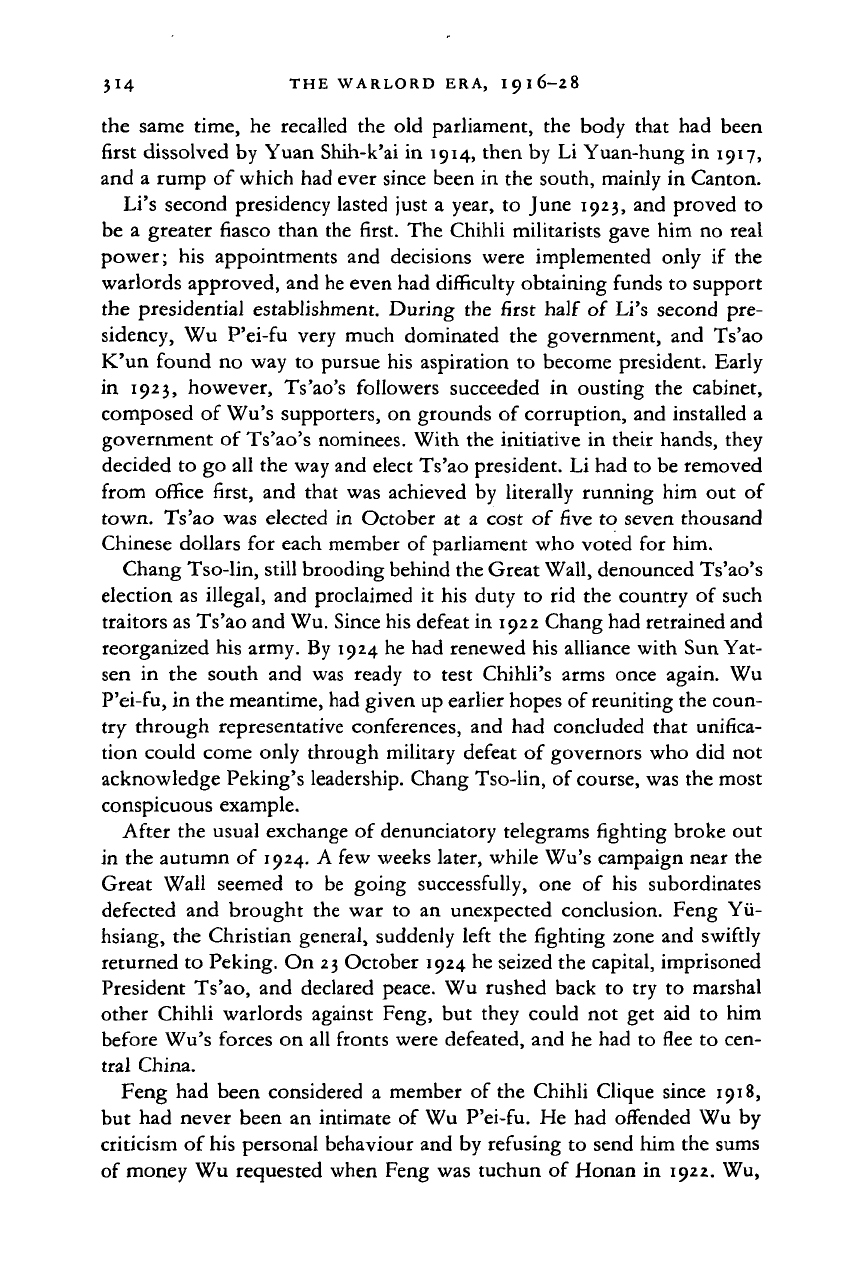
314 THE WARLORD ERA, I 9 I 6-2 8
the same time, he recalled the old parliament, the body that had been
first dissolved by Yuan Shih-k'ai in 1914, then by Li Yuan-hung in 1917,
and a rump of which had ever since been in the south, mainly in Canton.
Li's second presidency lasted just a year, to June 1923, and proved to
be a greater fiasco than the first. The Chihli militarists gave him no real
power; his appointments and decisions were implemented only if the
warlords approved, and he even had difficulty obtaining funds to support
the presidential establishment. During the first half of Li's second pre-
sidency, Wu P'ei-fu very much dominated the government, and Ts'ao
K'un found no way to pursue his aspiration to become president. Early
in 1923, however, Ts'ao's followers succeeded in ousting the cabinet,
composed of Wu's supporters, on grounds of corruption, and installed a
government of Ts'ao's nominees. With the initiative in their hands, they
decided to go all the way and elect Ts'ao president. Li had to be removed
from office first, and that was achieved by literally running him out of
town. Ts'ao was elected in October at a cost of five to seven thousand
Chinese dollars for each member of parliament who voted for him.
Chang Tso-lin, still brooding behind the Great Wall, denounced Ts'ao's
election as illegal, and proclaimed it his duty to rid the country of such
traitors as Ts'ao and Wu. Since his defeat in 1922 Chang had retrained and
reorganized his army. By 1924 he had renewed his alliance with Sun Yat-
sen in the south and was ready to test Chihli's arms once again. Wu
P'ei-fu, in the meantime, had given up earlier hopes of reuniting the coun-
try through representative conferences, and had concluded that unifica-
tion could come only through military defeat of governors who did not
acknowledge Peking's leadership. Chang Tso-lin, of course, was the most
conspicuous example.
After the usual exchange of denunciatory telegrams fighting broke out
in the autumn of 1924. A few weeks later, while Wu's campaign near the
Great Wall seemed to be going successfully, one of his subordinates
defected and brought the war to an unexpected conclusion. Feng Yii-
hsiang, the Christian general, suddenly left the fighting zone and swiftly
returned to Peking. On 23 October 1924 he seized the capital, imprisoned
President Ts'ao, and declared peace. Wu rushed back to try to marshal
other Chihli warlords against Feng, but they could not get aid to him
before Wu's forces on all fronts were defeated, and he had to flee to cen-
tral China.
Feng had been considered a member of the Chihli Clique since 1918,
but had never been an intimate of Wu P'ei-fu. He had offended Wu by
criticism of his personal behaviour and by refusing to send him the sums
of money Wu requested when Feng was tuchun of Honan in 1922. Wu,
Cambridge Histories Online © Cambridge University Press, 2008
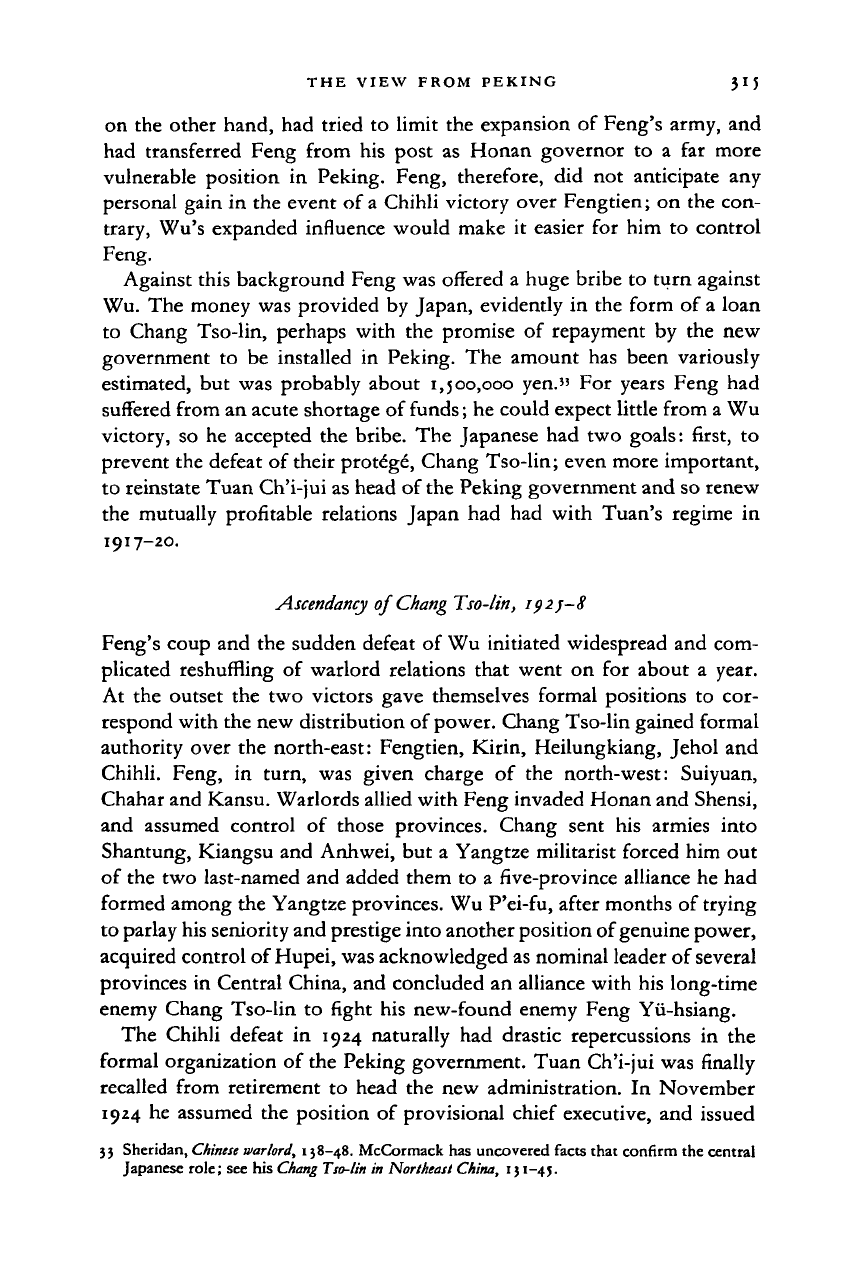
THE VIEW FROM PEKING }I5
on the other hand, had tried to limit the expansion of Feng's army, and
had transferred Feng from his post as Honan governor to a far more
vulnerable position in Peking. Feng, therefore, did not anticipate any
personal gain in the event of a Chihli victory over Fengtien; on the con-
trary, Wu's expanded influence would make it easier for him to control
Feng.
Against this background Feng was offered a huge bribe to turn against
Wu. The money was provided by Japan, evidently in the form of a loan
to Chang Tso-lin, perhaps with the promise of repayment by the new
government to be installed in Peking. The amount has been variously
estimated, but was probably about
1,500,000
yen." For years Feng had
suffered from an acute shortage of funds; he could expect little from a Wu
victory, so he accepted the bribe. The Japanese had two goals: first, to
prevent the defeat of their protdge, Chang Tso-lin; even more important,
to reinstate Tuan Ch'i-jui as head of the Peking government and so renew
the mutually profitable relations Japan had had with Tuan's regime in
1917-20.
Ascendancy of
Chang
Tso-lin, 192
j-8
Feng's coup and the sudden defeat of Wu initiated widespread and com-
plicated reshuffling of warlord relations that went on for about a year.
At the outset the two victors gave themselves formal positions to cor-
respond with the new distribution of power. Chang Tso-lin gained formal
authority over the north-east: Fengtien, Kirin, Heilungkiang, Jehol and
Chihli. Feng, in turn, was given charge of the north-west: Suiyuan,
Chahar and Kansu. Warlords allied with Feng invaded Honan and Shensi,
and assumed control of those provinces. Chang sent his armies into
Shantung, Kiangsu and Anhwei, but a Yangtze militarist forced him out
of the two last-named and added them to a five-province alliance he had
formed among the Yangtze provinces. Wu P'ei-fu, after months of trying
to parlay his seniority and prestige into another position of genuine power,
acquired control of Hupei, was acknowledged as nominal leader of several
provinces in Central China, and concluded an alliance with his long-time
enemy Chang Tso-lin to fight his new-found enemy Feng Yii-hsiang.
The Chihli defeat in 1924 naturally had drastic repercussions in the
formal organization of the Peking government. Tuan Ch'i-jui was finally
recalled from retirement to head the new administration. In November
1924 he assumed the position of provisional chief executive, and issued
33 Sheridan,
Chinese
warlord,
158-48. McCormack has uncovered facts that confirm the central
Japanese role; see his
Chang Tso-lin
in Northeast
China,
1 3
1-4j.
Cambridge Histories Online © Cambridge University Press, 2008
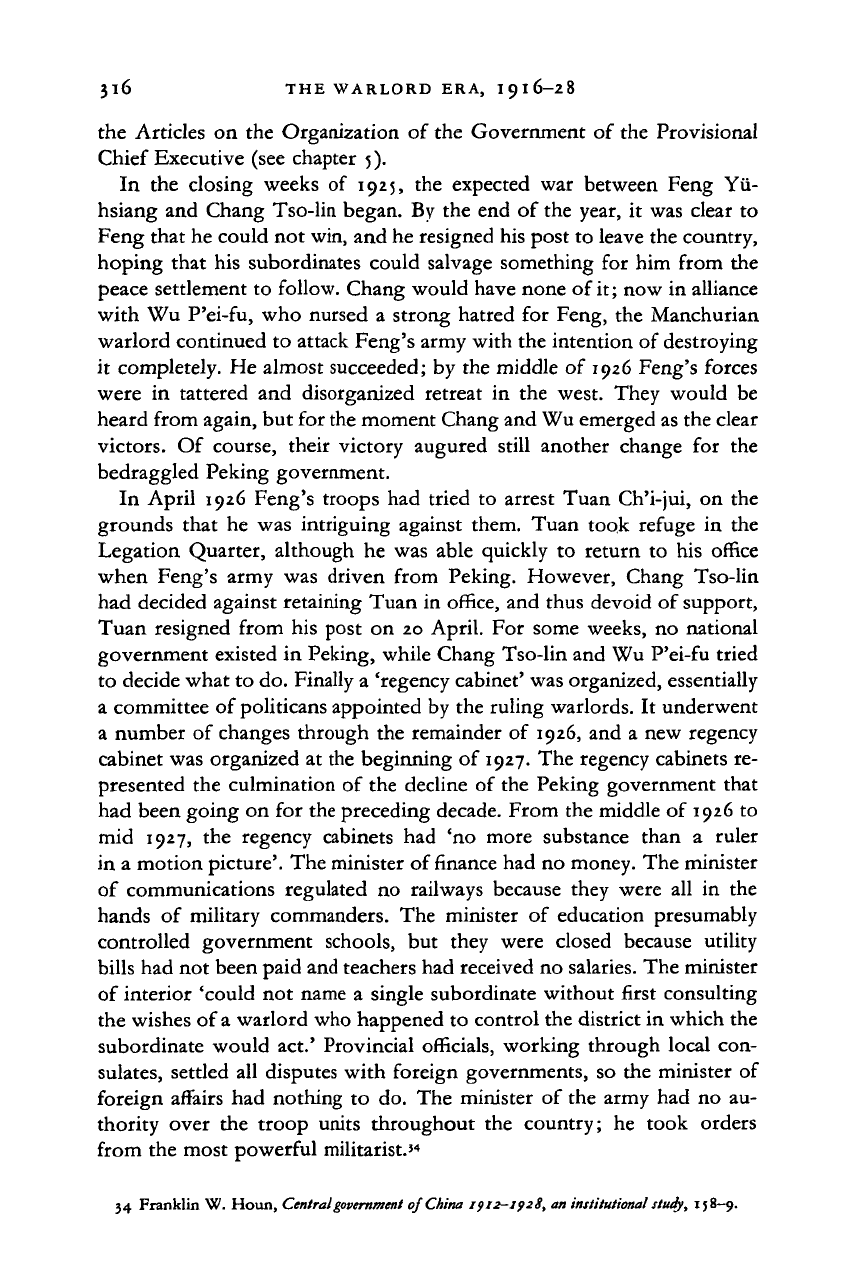
316 THE WARLORD ERA, I 9 I 6-2 8
the Articles on the Organization of the Government of the Provisional
Chief Executive (see chapter 5).
In the closing weeks of 1925, the expected war between Feng Yii-
hsiang and Chang Tso-lin began. By the end of the year, it was clear to
Feng that he could not win, and he resigned his post to leave the country,
hoping that his subordinates could salvage something for him from the
peace settlement to follow. Chang would have none of it; now in alliance
with Wu P'ei-fu, who nursed a strong hatred for Feng, the Manchurian
warlord continued to attack Feng's army with the intention of destroying
it completely. He almost succeeded; by the middle of 1926 Feng's forces
were in tattered and disorganized retreat in the west. They would be
heard from again, but for the moment Chang and Wu emerged as the clear
victors. Of course, their victory augured still another change for the
bedraggled Peking government.
In April 1926 Feng's troops had tried to arrest Tuan Ch'i-jui, on the
grounds that he was intriguing against them. Tuan took refuge in the
Legation Quarter, although he was able quickly to return to his office
when Feng's army was driven from Peking. However, Chang Tso-lin
had decided against retaining Tuan in office, and thus devoid of support,
Tuan resigned from his post on 20 April. For some weeks, no national
government existed in Peking, while Chang Tso-lin and Wu P'ei-fu tried
to decide what to do. Finally a 'regency cabinet' was organized, essentially
a committee of politicans appointed by the ruling warlords. It underwent
a number of changes through the remainder of 1926, and a new regency
cabinet was organized at the beginning of 1927. The regency cabinets re-
presented the culmination of the decline of the Peking government that
had been going on for the preceding decade. From the middle of 1926 to
mid 1927, the regency cabinets had 'no more substance than a ruler
in a motion picture'. The minister of finance had no money. The minister
of communications regulated no railways because they were all in the
hands of military commanders. The minister of education presumably
controlled government schools, but they were closed because utility
bills had not been paid and teachers had received no salaries. The minister
of interior 'could not name a single subordinate without first consulting
the wishes of
a
warlord who happened to control the district in which the
subordinate would act.' Provincial officials, working through local con-
sulates, settled all disputes with foreign governments, so the minister of
foreign affairs had nothing to do. The minister of the army had no au-
thority over the troop units throughout the country; he took orders
from the most powerful militarist.'
4
34 Franklin W. Houn, Central
government
of
China
1)12-1928, an
institutional
study,
158-9.
Cambridge Histories Online © Cambridge University Press, 2008
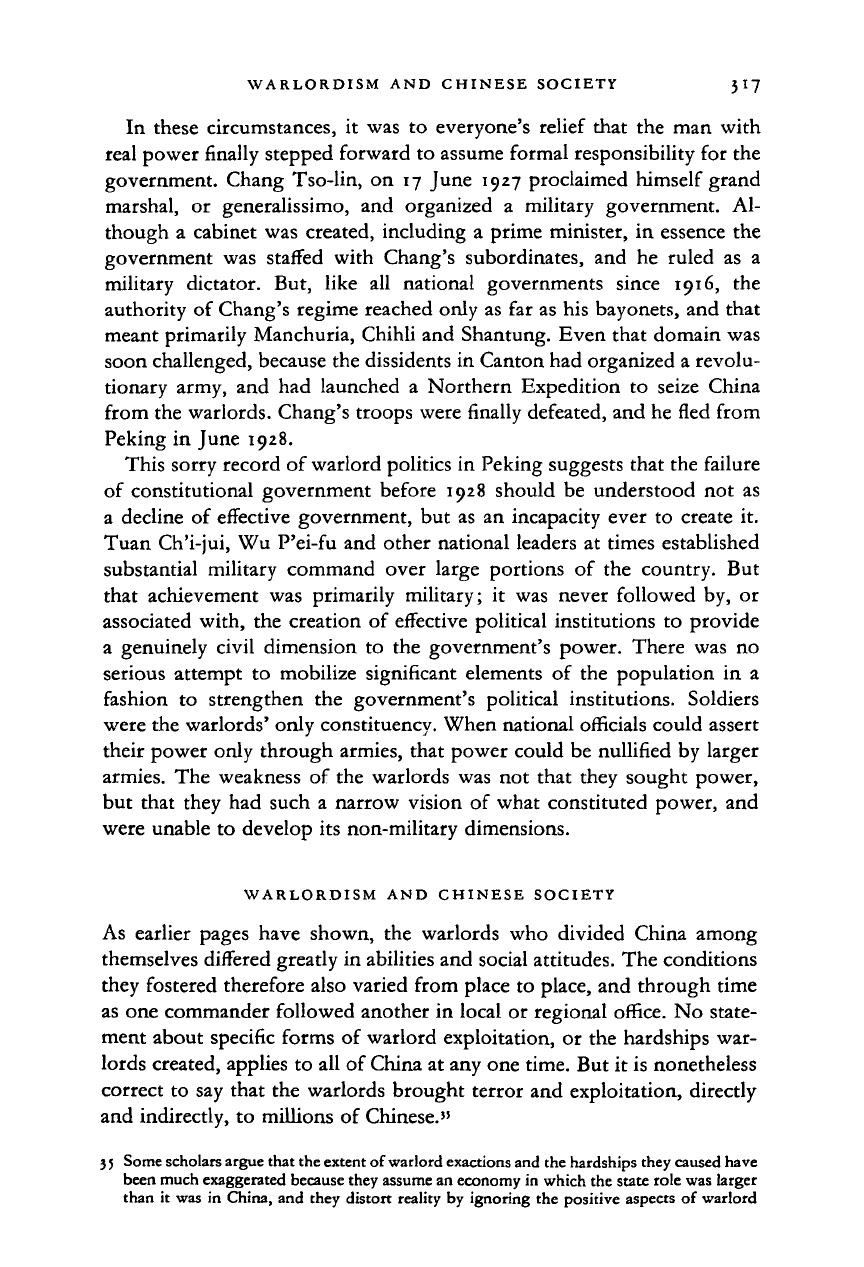
WARLORDISM AND CHINESE SOCIETY 317
In these circumstances,
it was to
everyone's relief that
the man
with
real power finally stepped forward
to
assume formal responsibility
for the
government. Chang Tso-lin,
on 17
June 1927 proclaimed himself grand
marshal,
or
generalissimo,
and
organized
a
military government.
Al-
though
a
cabinet
was
created, including
a
prime minister,
in
essence
the
government
was
staffed with Chang's subordinates,
and he
ruled
as a
military dictator.
But,
like
all
national governments since
1916, the
authority
of
Chang's regime reached only
as far as his
bayonets,
and
that
meant primarily Manchuria, Chihli
and
Shantung. Even that domain was
soon challenged, because the dissidents
in
Canton had organized
a
revolu-
tionary army,
and had
launched
a
Northern Expedition
to
seize China
from the warlords. Chang's troops were finally defeated, and
he
fled from
Peking
in
June 1928.
This sorry record
of
warlord politics
in
Peking suggests that the failure
of constitutional government before
1928
should
be
understood
not as
a decline
of
effective government,
but as an
incapacity ever
to
create
it.
Tuan Ch'i-jui,
Wu
P'ei-fu
and
other national leaders
at
times established
substantial military command over large portions
of the
country.
But
that achievement
was
primarily military;
it was
never followed
by, or
associated with,
the
creation
of
effective political institutions
to
provide
a genuinely civil dimension
to the
government's power. There
was no
serious attempt
to
mobilize significant elements
of the
population
in a
fashion
to
strengthen
the
government's political institutions. Soldiers
were the warlords' only constituency. When national officials could assert
their power only through armies, that power could
be
nullified
by
larger
armies.
The
weakness
of the
warlords
was not
that they sought power,
but that they
had
such
a
narrow vision
of
what constituted power,
and
were unable
to
develop
its
non-military dimensions.
WARLORDISM AND CHINESE SOCIETY
As earlier pages have shown,
the
warlords
who
divided China among
themselves differed greatly
in
abilities and social attitudes. The conditions
they fostered therefore also varied from place
to
place,
and
through time
as one commander followed another
in
local
or
regional office.
No
state-
ment about specific forms
of
warlord exploitation,
or the
hardships
war-
lords created, applies
to all of
China
at
any one time. But
it
is nonetheless
correct
to say
that
the
warlords brought terror
and
exploitation, directly
and indirectly,
to
millions
of
Chinese."
35 Some scholars argue that the extent
of
warlord exactions and the hardships they caused have
been much exaggerated because they assume an economy
in
which the state role was larger
than
it was in
China,
and
they distort reality
by
ignoring
the
positive aspects
of
warlord
Cambridge Histories Online © Cambridge University Press, 2008
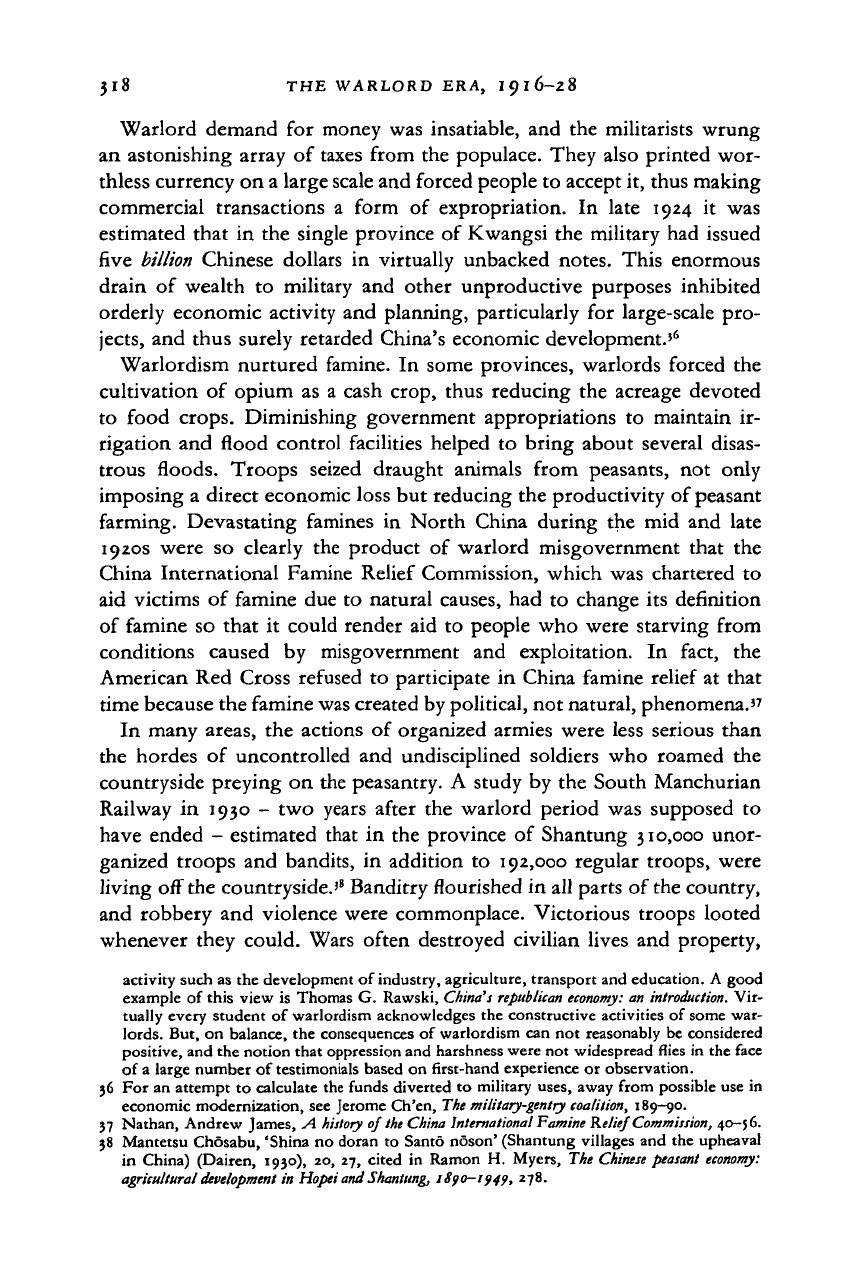
3
I 8 THE WARLORD ERA, 1916-28
Warlord demand for money was insatiable, and the militarists wrung
an astonishing array of taxes from the populace. They also printed wor-
thless currency on a large scale and forced people to accept it, thus making
commercial transactions a form of expropriation. In late 1924 it was
estimated that in the single province of Kwangsi the military had issued
five billion Chinese dollars in virtually unbacked notes. This enormous
drain of wealth to military and other unproductive purposes inhibited
orderly economic activity and planning, particularly for large-scale pro-
jects,
and thus surely retarded China's economic development.'
6
Warlordism nurtured famine. In some provinces, warlords forced the
cultivation of opium as a cash crop, thus reducing the acreage devoted
to food crops. Diminishing government appropriations to maintain ir-
rigation and flood control facilities helped to bring about several disas-
trous floods. Troops seized draught animals from peasants, not only
imposing a direct economic loss but reducing the productivity of peasant
farming. Devastating famines in North China during the mid and late
1920s were so clearly the product of warlord misgovernment that the
China International Famine Relief Commission, which was chartered to
aid victims of famine due to natural causes, had to change its definition
of famine so that it could render aid to people who were starving from
conditions caused by misgovernment and exploitation. In fact, the
American Red Cross refused to participate in China famine relief at that
time because the famine was created by political, not natural, phenomena."
In many areas, the actions of organized armies were less serious than
the hordes of uncontrolled and undisciplined soldiers who roamed the
countryside preying on the peasantry. A study by the South Manchurian
Railway in 1930 - two years after the warlord period was supposed to
have ended - estimated that in the province of Shantung 310,000 unor-
ganized troops and bandits, in addition to 192,000 regular troops, were
living off the countryside.'
8
Banditry flourished in all parts of the country,
and robbery and violence were commonplace. Victorious troops looted
whenever they could. Wars often destroyed civilian lives and property,
activity such as the development of industry, agriculture, transport and education. A good
example of this view is Thomas G. Rawski, China's
republican
economy:
an
introduction.
Vir-
tually
every student of warlordism acknowledges the constructive activities of some war-
lords.
But, on balance, the consequences of warlordism can not reasonably be considered
positive,
and the notion that oppression and harshness were not widespread flies in the face
of
a large number of
testimonials
based on first-hand experience or observation.
36
For an attempt to calculate the funds diverted to military
uses,
away from possible use in
economic
modernization, see Jerome Ch'en, The military-gentry
coalition,
189-90.
37
Nathan, Andrew
James,
A
history
of
the
China
International
¥amine Relief
Commission,
40-56.
38
Mantetsu Chosabu, 'Shina no doran to Santo noson' (Shantung villages and the upheaval
in
China) (Dairen,
1930),
20, 27, cited in Ramon H.
Myers,
The
Chinese
peasant
economy:
agricultural development
in Hopti
and
Shantung,
1890-1949, 278.
Cambridge Histories Online © Cambridge University Press, 2008
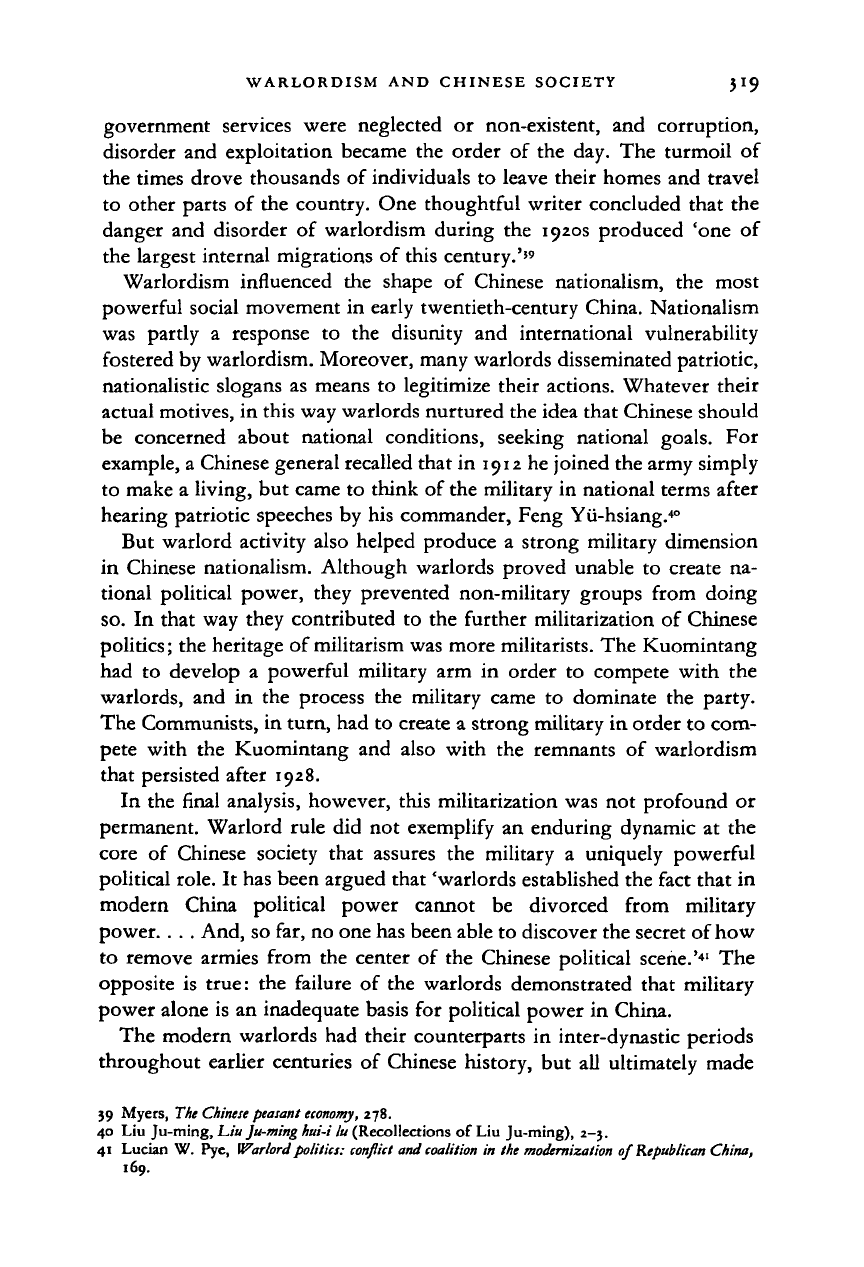
WARLORDISM AND CHINESE SOCIETY 319
government services were neglected or non-existent, and corruption,
disorder and exploitation became the order of the day. The turmoil of
the times drove thousands of individuals to leave their homes and travel
to other parts of the country. One thoughtful writer concluded that the
danger and disorder of warlordism during the 1920s produced 'one of
the largest internal migrations of this century.''
9
Warlordism influenced the shape of Chinese nationalism, the most
powerful social movement in early twentieth-century China. Nationalism
was partly a response to the disunity and international vulnerability
fostered by warlordism. Moreover, many warlords disseminated patriotic,
nationalistic slogans as means to legitimize their actions. Whatever their
actual motives, in this way warlords nurtured the idea that Chinese should
be concerned about national conditions, seeking national goals. For
example, a Chinese general recalled that in 1912 he joined the army simply
to make a living, but came to think of the military in national terms after
hearing patriotic speeches by his commander, Feng Yii-hsiang.
40
But warlord activity also helped produce a strong military dimension
in Chinese nationalism. Although warlords proved unable to create na-
tional political power, they prevented non-military groups from doing
so.
In that way they contributed to the further militarization of Chinese
politics; the heritage of militarism was more militarists. The Kuomintang
had to develop a powerful military arm in order to compete with the
warlords, and in the process the military came to dominate the party.
The Communists, in turn, had to create a strong military in order to com-
pete with the Kuomintang and also with the remnants of warlordism
that persisted after 1928.
In the final analysis, however, this militarization was not profound or
permanent. Warlord rule did not exemplify an enduring dynamic at the
core of Chinese society that assures the military a uniquely powerful
political role. It has been argued that 'warlords established the fact that in
modern China political power cannot be divorced from military
power. . . . And, so far, no one has been able to discover the secret of how
to remove armies from the center of the Chinese political scene.'
41
The
opposite is true: the failure of the warlords demonstrated that military
power alone is an inadequate basis for political power in China.
The modern warlords had their counterparts in inter-dynastic periods
throughout earlier centuries of Chinese history, but all ultimately made
39 Myers,
The Chinese peasant
economy,
278.
40 Liu Ju-ming,
LJu Ju-ming hui-i
lu (Recollections of Liu Ju-ming), 2-3.
41 Lucian W. Pye, Warlord politics:
conflict and coalition
in the
modernization
of
Republican
China,
169.
Cambridge Histories Online © Cambridge University Press, 2008
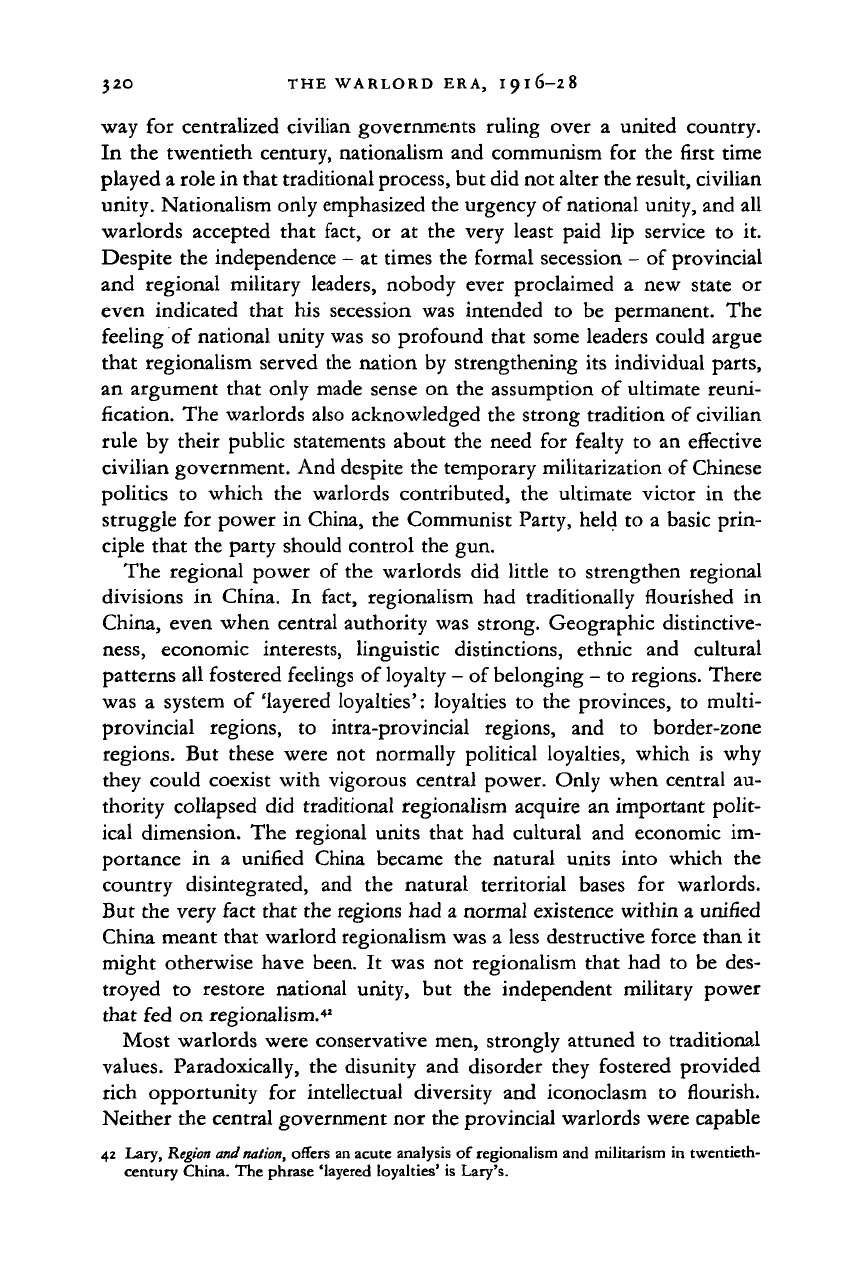
32O THE WARLORD ERA, I 9 I 6-2 8
way for centralized civilian governments ruling over a united country.
In the twentieth century, nationalism and communism for the first time
played a role in that traditional process, but did not alter the result, civilian
unity. Nationalism only emphasized the urgency of national unity, and all
warlords accepted that fact, or at the very least paid lip service to it.
Despite the independence - at times the formal secession - of provincial
and regional military leaders, nobody ever proclaimed a new state or
even indicated that his secession was intended to be permanent. The
feeling of national unity was so profound that some leaders could argue
that regionalism served the nation by strengthening its individual parts,
an argument that only made sense on the assumption of ultimate reuni-
fication. The warlords also acknowledged the strong tradition of civilian
rule by their public statements about the need for fealty to an effective
civilian government. And despite the temporary militarization of Chinese
politics to which the warlords contributed, the ultimate victor in the
struggle for power in China, the Communist Party, held to a basic prin-
ciple that the party should control the gun.
The regional power of the warlords did little to strengthen regional
divisions in China. In fact, regionalism had traditionally flourished in
China, even when central authority was strong. Geographic distinctive-
ness,
economic interests, linguistic distinctions, ethnic and cultural
patterns all fostered feelings of loyalty - of belonging - to regions. There
was a system of 'layered loyalties': loyalties to the provinces, to multi-
provincial regions, to intra-provincial regions, and to border-zone
regions. But these were not normally political loyalties, which is why
they could coexist with vigorous central power. Only when central au-
thority collapsed did traditional regionalism acquire an important polit-
ical dimension. The regional units that had cultural and economic im-
portance in a unified China became the natural units into which the
country disintegrated, and the natural territorial bases for warlords.
But the very fact that the regions had a normal existence within a unified
China meant that warlord regionalism was a less destructive force than it
might otherwise have been. It was not regionalism that had to be des-
troyed to restore national unity, but the independent military power
that fed on regionalism.
42
Most warlords were conservative men, strongly attuned to traditional
values. Paradoxically, the disunity and disorder they fostered provided
rich opportunity for intellectual diversity and iconoclasm to flourish.
Neither the central government nor the provincial warlords were capable
42 Lary,
Region
and
nation,
offers an acute analysis of regionalism and militarism in twentieth-
century China. The phrase 'layered loyalties' is Lary's.
Cambridge Histories Online © Cambridge University Press, 2008

WARLORDISM AND CHINESE SOCIETY 321
of efficiently controlling the universities, periodicals, publishing industries
and other agencies of China's intellectual life. Chinese intellectuals in
those years, partly in response to the evils of warlordism, engaged in the
most intense discussion of ways in which China might be modernized
and strengthened. The founding of the Communist Party in 1921 and the
reorganization of the Kuomintang in 1924 stemmed partly from this
intellectual flowering. Thus, on the one hand, the warlord years repre-
sented the low point of political unity and national strength in the twen-
tieth century. On the other hand, they also represented the peak of
intellectual and literary achievement, and out of that tumultuous and
bloody era, partly in response to the warlords, flowed the intellectual
and social movements that culminated in the reunification and rejuvena-
tion of China.
Cambridge Histories Online © Cambridge University Press, 2008
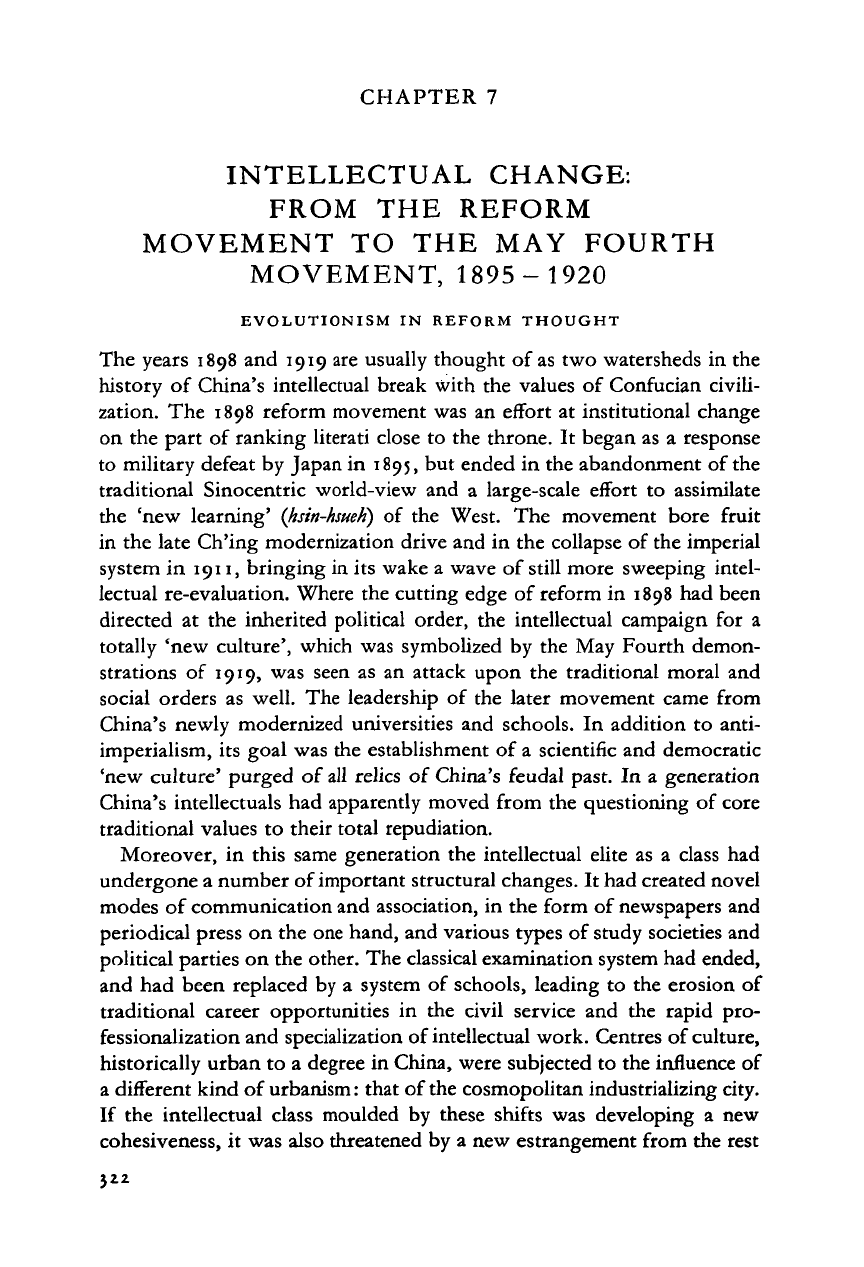
CHAPTER
7
INTELLECTUAL CHANGE:
FROM
THE
REFORM
MOVEMENT
TO THE MAY
FOURTH
MOVEMENT, 1895-1920
EVOLUTIONISM IN REFORM THOUGHT
The years 1898 and 1919 are usually thought
of
as two watersheds
in
the
history
of
China's intellectual break with
the
values
of
Confucian civili-
zation.
The
1898 reform movement was
an
effort
at
institutional change
on the part
of
ranking literati close
to
the throne.
It
began as
a
response
to military defeat by Japan in 1895, but ended
in
the abandonment of the
traditional Sinocentric world-view
and
a
large-scale effort
to
assimilate
the
'new
learning'
(Jisin-hsueh)
of
the
West.
The
movement bore fruit
in the late Ch'ing modernization drive and
in
the collapse
of
the imperial
system
in
1911, bringing in its wake
a
wave
of
still more sweeping intel-
lectual re-evaluation. Where the cutting edge
of
reform
in
1898 had been
directed
at
the
inherited political order,
the
intellectual campaign
for a
totally 'new culture', which was symbolized
by
the
May Fourth demon-
strations
of
1919,
was
seen
as
an
attack upon
the
traditional moral
and
social orders
as
well. The leadership
of
the later movement came from
China's newly modernized universities
and
schools.
In
addition
to
anti-
imperialism,
its
goal was the establishment
of
a scientific and democratic
'new culture' purged
of
all relics
of
China's feudal past.
In a
generation
China's intellectuals had apparently moved from the questioning
of
core
traditional values
to
their total repudiation.
Moreover,
in
this same generation
the
intellectual elite
as a
class
had
undergone a number of important structural changes. It had created novel
modes
of
communication and association,
in
the form
of
newspapers and
periodical press
on
the one hand, and various types
of
study societies and
political parties on the other. The classical examination system had ended,
and
had
been replaced by
a
system
of
schools, leading
to
the erosion
of
traditional career opportunities
in the
civil service
and the
rapid
pro-
fessionalization and speciali2ation of intellectual work. Centres of culture,
historically urban
to
a
degree in China, were subjected
to
the influence of
a different kind
of
urbanism: that of the cosmopolitan industrializing city.
If
the
intellectual class moulded
by
these shifts
was
developing
a
new
cohesiveness,
it
was also threatened by
a
new estrangement from the rest
3"
Cambridge Histories Online © Cambridge University Press, 2008
